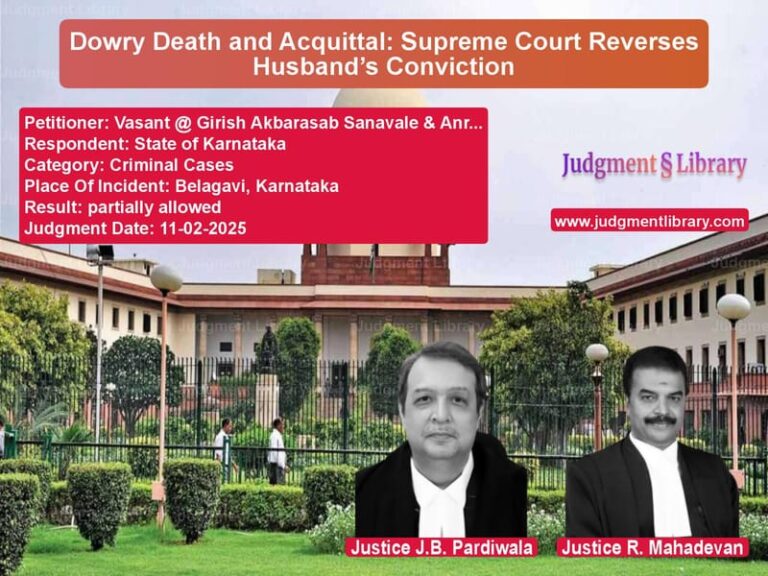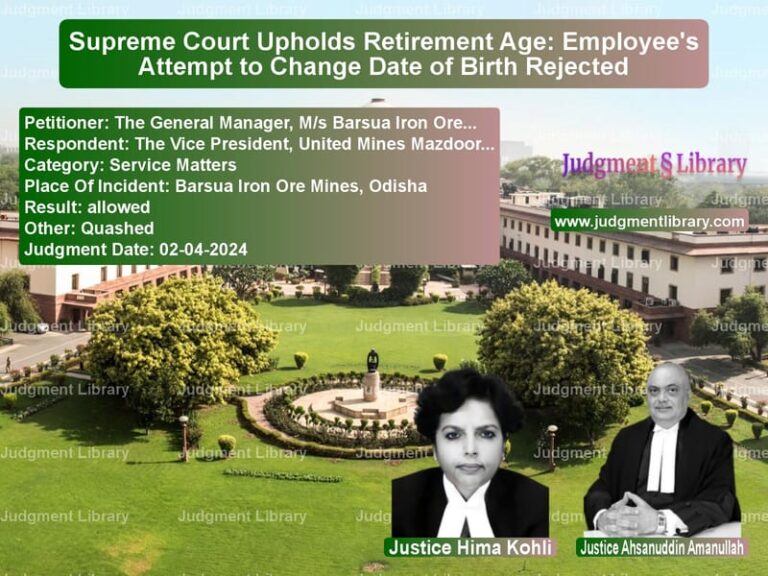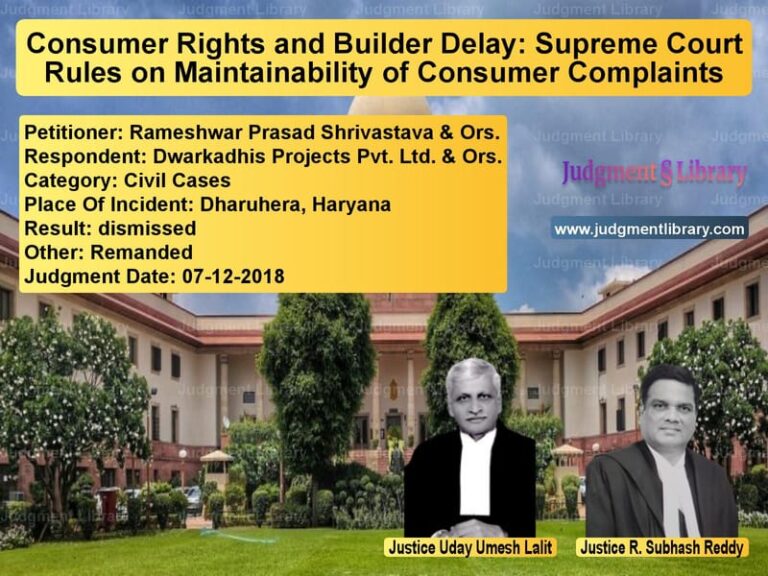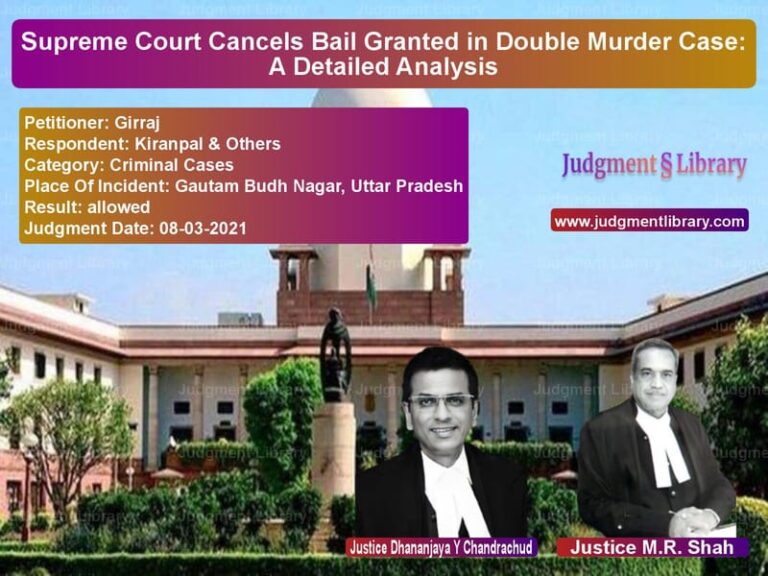Supreme Court Refers Judicial Appointment Dispute to Larger Bench
The Supreme Court of India, in the case of Dheeraj Mor vs. Hon’ble High Court of Delhi, addressed a critical constitutional issue regarding the eligibility criteria for direct recruitment of District Judges. The case primarily dealt with the interpretation of Article 233 of the Constitution of India, which governs the appointment of District Judges.
Background of the Case
The case arose from multiple petitions challenging the eligibility criteria for the appointment of District Judges through direct recruitment. The petitioners, including judicial officers and advocates, contested the interpretation of Article 233 and sought clarity on whether judicial officers with prior advocacy experience could apply for District Judge posts under the quota reserved for advocates.
Key aspects of the case:
- The petitioners argued that judicial officers with seven years of combined judicial and advocacy experience should be eligible.
- The respondents, primarily the High Court of Delhi, contended that only practicing advocates with seven years of continuous practice could apply.
- The case had significant implications for the judicial appointment process across India.
Key Legal Issues
- Does Article 233 allow judicial officers with prior advocacy experience to apply for District Judge positions under the advocate quota?
- Should eligibility be determined at the time of application or appointment?
- Does the requirement of ‘seven years of practice’ under Article 233 include time spent in judicial service?
Arguments by the Petitioners (Judicial Officers & Advocates)
The petitioners contended:
- Judicial officers who had practiced as advocates for at least seven years before joining judicial service should be considered eligible.
- The requirement under Article 233 should be read liberally to include judicial officers who had prior advocacy experience.
- Disqualifying judicial officers from applying under the advocate quota was discriminatory and unconstitutional.
- Some states had framed rules allowing judicial officers to apply, indicating flexibility in interpretation.
Arguments by the Respondents (High Court of Delhi & Others)
The respondents countered:
- Article 233 clearly distinguishes between judicial service and advocacy, and the advocate quota should be reserved for practicing advocates only.
- Allowing judicial officers to compete under the advocate quota would create an imbalance in the selection process.
- Judicial officers should compete under the promotion quota and not through direct recruitment.
- Granting eligibility to judicial officers under the advocate quota would violate the constitutional intent behind Article 233.
Supreme Court’s Observations
The Supreme Court examined multiple past judgments and constitutional provisions, making the following key observations:
- “The eligibility for appointment as a District Judge should be examined in light of both the text and intent of Article 233.”
- “There is a clear distinction between recruitment from the Bar and promotion from the judicial service.”
- “Judicial officers with prior advocacy experience do not automatically qualify under the advocate quota once they join judicial service.”
- “Given the conflicting interpretations and significant constitutional questions involved, the matter should be referred to a larger bench.”
Supreme Court’s Judgment
The Supreme Court decided not to issue a final ruling but instead referred the matter to a larger bench for authoritative interpretation. The key directives included:
- The case was placed before the Chief Justice of India for constituting an appropriate bench.
- Until a final decision was made, pending recruitment processes were to follow existing criteria.
- Judicial officers who had applied for District Judge posts under the advocate quota were allowed to participate provisionally.
Key Legal Precedents Considered
The Supreme Court reviewed several important judgments:
- Rameshwar Dayal vs. State of Punjab (1961): Addressed eligibility criteria for judicial appointments.
- Chandra Mohan vs. State of Uttar Pradesh (1966): Clarified the distinction between judicial service and advocacy under Article 233.
- Satya Narain Singh vs. High Court of Allahabad (1985): Held that judicial officers could not apply under the advocate quota.
- Deepak Aggarwal vs. Keshav Kaushik (2013): Examined whether a public prosecutor could be considered an advocate for judicial appointments.
- Vijay Kumar Mishra vs. High Court of Patna (2016): Distinguished between ‘selection’ and ‘appointment’ in service law.
Implications of the Judgment
This ruling has significant implications for judicial appointments:
- Ensures a uniform interpretation of Article 233 across states.
- Prevents ambiguity in judicial recruitment processes.
- Determines whether judicial officers with prior advocacy experience can compete under the advocate quota.
- Affects future recruitment policies for District Judges.
Conclusion
The Supreme Court’s decision in Dheeraj Mor vs. Hon’ble High Court of Delhi highlights the complexity of judicial recruitment under Article 233. By referring the matter to a larger bench, the Court has taken a cautious approach to ensure a definitive constitutional interpretation. The ruling will significantly impact future judicial appointments and recruitment policies across India.
Don’t miss out on the full details! Download the complete judgment in PDF format below and gain valuable insights instantly!
Download Judgment: Dheeraj Mor vs Hon’ble High Court o Supreme Court of India Judgment Dated 23-01-2018.pdf
Direct Downlaod Judgment: Direct downlaod this Judgment
See all petitions in Recruitment Policies
See all petitions in Public Sector Employees
See all petitions in Judgment by Kurian Joseph
See all petitions in Judgment by Mohan M. Shantanagoudar
See all petitions in Remanded
See all petitions in Referred to Larger Bench
See all petitions in supreme court of India judgments January 2018
See all petitions in 2018 judgments
See all posts in Service Matters Category
See all allowed petitions in Service Matters Category
See all Dismissed petitions in Service Matters Category
See all partially allowed petitions in Service Matters Category







